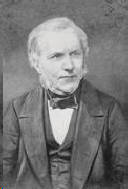an extract from the History of the Bristol Royal Infirmary by G Munro Smith
WILLIAM FRANCIS MORGAN

W. F. Morga
n, who had held the important post of Resident Apothecary for eight years, with great advantage to the Institution, was elected in Hetling's place on November 23rd,1837·W
illiam Francis Morgan was born at Shepton Mallet, in Somersetshire, in August, 1800, and received his elementary education under Mr. Rogers, of Dursley, and Mr. Mules, of Ilminster. It is recorded that " he read Homer, Demosthenes, and Xenophon, together with Juvenal, Virgil and Horace," a proof, amongst many others recorded in this history, that the old-fashioned apothecaries and surgeons were not the illiterate persons often represented jn novels. That he profited by his schooling is evidenced by the excellent testimonials given him by Mr. Mules.He wa
s apprenticed to Richard Smith for five years, for which he paid two hundred guineas, and served as Physician’s pupil during the year 1820. After this he went to London, where he assiduously attended lectures by Abernethy and others, and a course at the London Eye Hospital.When
he returned to Bristol he settled in Bridge Street in 1824, and was elected Apothecary to the Infirmary on July 7th, 1825, being the only candidate who came to the poll. He resigned this office in April, 1833, and on April r8th (when his successor, Frederick Leman, was elected) he received not only a vote of thanks from the Trustees, but a special one from the Staff, so highly were his services appreciated.After
he left the resident post at the Infirmary he set up his plate in Park Street, and at once began to get into practice, making £150 his first year...We h
ave seen that he was elected Surgeon in 1837, and'resigned in April, 1854. On May 4th he was unanimously elected Consulting Surgeon.Both
as Apothecary and Surgeon to the Infirmary he won “ golden opinions from all sorts of people," and there is no doubt that he would have been an excellent teacher and lecturer had it not been for a slight "stammer," which interfered with his utterance."
As I remember him," says Mr. A.W. Prichard, " he was a grey-whiskered little man, neatly dressed in a long frock coat. Documents which I have seen concerning him, and the testimonials which he received from his colleagues and the Committee, show what a very high opinion everyone had formed of his worth and character, and old friends now living tell me they look back upon Mr. Morgan as an ideal of everything that was kind and good and true."H
e died rather suddenly of heart disease on Sunday, December 7th, 1872.